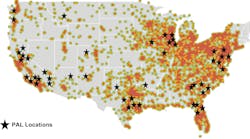Business as unusual: Declining productivity points to uncertain future
Even in the trucking industry, where people are accustomed to hard work and plenty of it, auto transportation stands out as a particularly demanding driving job. "In this environment, the driver has to play a number of roles," says Robert Lane, quality assurance manager for The Waggoners Trucking, a privately held vehicle transportation company headquartered in Billings, Mont.
"Our drivers have to inspect each vehicle before moving it," Lane explains. "Then they physically load the vehicles on the trailer. Manufacturers all have special requirements for loading and securing their units, and the adjustable trailer equipment has its own characteristics and constraints. Once they're actually on the road," he continues, "drivers might drop all the cars at one location or they might make several delivery stops. As each vehicle is delivered, the driver conducts a co-inspection with the dealer to audit for in-transit damage.
"In the course of doing business, drivers really act as customer service and sales representatives," Lane adds. "Their conduct and appearance have a big impact on the success of the company."
With these skill requirements come higher pay, better benefits, and a very low turnover rate for drivers, says Bob Farrell, president of the National Automobile Transporters Assn. "For our segment of the industry, driver turnover of 4% or less is standard," he notes, "and pay is generally somewhere around 90 cents per mile for union drivers."
The role and status of drivers is not the only thing that sets auto hauling apart from the rest of trucking. In numerous other respects, it is business as unusual. For starters, loaded miles for car carriers have been steadily decreasing since 1985, even though trucking in general has been booming and the production of cars and light trucks has grown dramatically, says Farrell.
Part of the problem is that car carriers are losing business to railroads. According to R. Ian Hunter, executive director of the National Automobile Transporters Labor Div. (NATLD), the multi-employer collective bargaining arm of the unionized auto hauling industry, only one in ten motor vehicles left assembly plants by rail in 1960. By 1997, he points out, 71% of all vehicles manufactured in the U.S. had been assigned to the rails. Changing manufacturing and distribution practices on the part of carmakers are facilitating this shift, according to Hunter, as is a demand for lower prices.
New nonunion carriers, many of them smaller fleets, have also been transforming the competitive climate. Chipmunk Transportation, St. Peters, Mo., is one such small newcomer to the car transportation business. Chipmunk hauls cars for "some dealers, but primarily for individuals," says owner Caren Vinson, who has big hopes for growth in 1999. "We got 73 requests for quotes just from the Internet this morning," she observes, "and we're bidding on a big state contract. If that comes in, we'll have to put 20 tractors on a dedicated run. It's a good problem to have."
For car carriers large or small, union or nonunion, a serious problem is declining productivity. Light trucks and sport utility vehicles are larger and heavier than cars and, because fewer units can be loaded onto the same rig, they're more costly to deliver. However, the rates currently do not reflect this cost differential. In many cases rates were set years ago when these vehicles represented a far smaller percentage of overall deliveries.
The higher average size and weight of light trucks and SUVs make loading and unloading more difficult. As a result, insurance and claims costs are higher.
All these factors and more are under scrutiny as NATLD employers and the Teamsters continue the contract negotiations begun in February. It's a high-stakes debate. "These discussions are not just about a new contract," says Hunter, "but the future of this industry."


